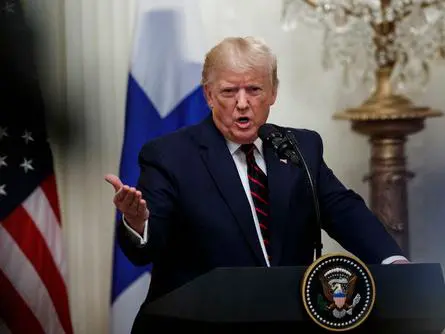Novak Djokovic came to Melbourne, the scene of six of his greatest triumphs, with the guarded intention of re-entering Roger Federer’s universe, of maybe even emulating his rival’s heroics of a year ago by returning to the Tour after missing half a year and winning another slam without the luxury of a serious warmup match.
Those were the outer limits of his ambitions. Unspoken was the fear that it would end painfully, and it did so on the eighth evening of the tournament. There would be no room in this town for two superheroes.
While the ageless meteor that is Federer blazed on, untroubled, Djokovic buckled after a magnificent fight over three hours and 21 minutes with Hyeon Chung – who goes on to an unlikely quarter-final against the world No97, Tennys Sandgren, the American who earlier upset the fifth seed, Dominic Thiem – and was left to contemplate the prospect of surgery to heal his aching right elbow.
“Unfortunately, it’s not great,” he revealed later. “At the end of the first set [which he took to a tie-break after going 4-0 down] it started hurting more. I had to deal with it until the end of the match.”
As for how long it might take to heal, after an already comprehensive rehab period, he said: “I really don’t know. I have to reassess everything with my medical team, coaches and everybody. Scan it, see what the situation is. Let’s see what’s inside.”
Djokovic needs a surgeon to dig into his elbow to get it back to full working order – much as Andy Murray conceded when he had hip surgery two weeks ago after trying physio for six months.
While few players could lose so nobly in straight sets to a player he beat out of sight in the first round two years ago and who is still only 21 and ranked 58 in the world, Djokovic is a realist.
Guarding his elbow with a restructured, shortened service action, he could conjure up just two aces, along with nine double faults.
“The level of pain was not that high that I needed to stop the match, even though it was obviously compromising my serve. That, of course, is a big shot, especially against Chung, who returns well, gets a lot of balls back. I wish I could have had more free points on the first serve but I didn’t.”
He said of Chung: “He definitely has the game to be a top-10 player, without a doubt. How far he can go, that depends on him. I respect him a lot because he’s a hard worker, he’s disciplined, he’s a nice guy, he’s quiet. You can see that he cares about his career and his performances.”
Others were just as glowing in their praise of the shy young South Korean who fist-pumped only reluctantly on his way to a 7-6 (4), 7-5, 7-6 (3) win.
“This is the heralding of a new star, someone who’s going to explode on the scene,” effused John McEnroe, who is partial to a banging the odd drum. “One of the new generation has clearly arrived,” enthused Lleyton Hewitt. “I cannot believe how good this kid is,” said Jim Courier.
Chung said courtside: “I don’t know how I did that. I’m just trying to copy Novak, because he’s my idol. I was ready to play two more hours. It’s a dream come true tonight.”
When they got to the deciding shootout, Djokovic was armed with a malfunctioning pistol. Chung fired from the hip. How mixed must the loser’s emotions have been when he made Chung’s night with a closing, weary backhand wide.
Earlier, Federer emerged into the sunlight after three matches in the cool of the evening during a wickedly hot first week and he proceeded to a routine but impressive win over Marton Fucsovics.
He won 6-4, 7-6 (3), 6-2 to reach the quarter-finals for the 14th time, the oldest player, at 36, to go this deep since Ken Rosewall 41 years ago. And, while he might have made easier work of an opponent who had never won three matches in a row before, his game is in decent shape.
Roger Federer of Switzerland plays a backhand in his fourth round match against Marton Fucsovics. Photograph: Chris Hyde/Getty Images
Next up is Tomas Berdych, who admitted recently he keeps playing at 32 hoping the older players in front of him will, sooner or later, collapse or go away. He beat Federer on his way to his only slam final, at Wimbledon eight years ago – when he lost to Nadal – and he looked something like his old self in defeating the Italian renegade Fabio Fognini 6-1, 6-4, 6-4 on Monday.
The Rod Laver Arena patrons were drawn to the doomed pursuit of a lost cause by the world No80 Fucsovics.
To contextualise, in 2002, Federer, then 20, and a 25-year-old Hungarian called Attila Savolt made their debuts in the Australian Open. The Swiss won their second-round match in straight sets and he went on to win the title five times, 14 other majors and $111,885,682 in prize money, so far. Savolt retired two years later after reaching a career-high ranking of 68 and earning $624,357 .
On Monday, Savolt was in Fucsovics’s box, cheering every shot, hoping his protege could do better than he did. Fucsovics stayed with Federer for much of the first half hour, but the defending champion was like a Formula One champion driving with the handbrake on, lest he crash on a hairpin corner.
(GUARDIAN)
 简体中文
简体中文

